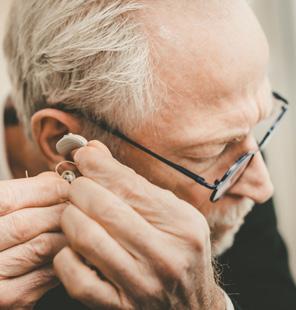
2 minute read
Baker Audiology
SECOND YEAR WINNER
21-22 WINNER
Advertisement
HEARING THE SOUNDS OF LIFE
Melissa Baker, M.A., CCC-A, FAAA

We are an advanced hearing practice that specializes in diagnosis, treatment, and prevention of hearing loss for all ages.
FREE HEARING SCREENING
UP TO $800 OFF A PAIR OF ADVANCED TECHNOLOGY HEARING AIDS* *Mention this ad.
Hours: Mon-Thurs 9am-5pm • Fri 9am-12pm 429 W 69th St • Sioux Falls, SD
WHAT IS THE BEST WAY TO MANAGE TINNITUS?
By Melissa Baker, M.A., CCC-A, FAAA Baker Audiology & Hearing Aids
Tinnitus is a condition that causes noise in the ear, often described as a ringing or buzzing. Tinnitus can be caused by many factors, including age, excessive exposure to loud noises and wax buildup in the ears. The sound of tinnitus can vary from quiet background noise to an intense roar making it difficult to sleep at night. This article discusses what you need to know about tinnitus, including how it's diagnosed and what types of treatment are available.
HOW IS TINNITUS DIAGNOSED?
Tinnitus can be diagnosed by an audiologist using various hearing tests. One of the most common ways to diagnose tinnitus is for your doctor to conduct an ear examination, including listening with a stethoscope or special tuning fork for specific sounds in your ears that are only present when you have tinnitus. You may also hear different pitches and tones while not experiencing any pain. A visit to an audiologist will help determine if there's anything blocking sound from entering one side of your head, which could indicate some form of hearing loss. The diagnosis process often requires more than just visiting the family physician.
HOW CAN A HEARING AID HELP WITH TINNITUS?
Hearing aids can help with tinnitus by amplifying soft sounds and reducing the volume of loud ones. This means that if you have tinnitus, your hearing aid will amplify more delicate noises while suppressing more audible noise to prevent them from experiencing any discomfort or pain caused by tinnitus. In addition, tinnitus is often associated with hyperacusis, so wearing a hearing aid might also help reduce this sensitivity. Finally, suppose you are struggling to manage tinnitus symptoms after trying numerous treatment options. In that case, it's worth visiting an audiologist who may recommend using a device such as a white noise machine in combination with other treatments, including counselling sessions.










